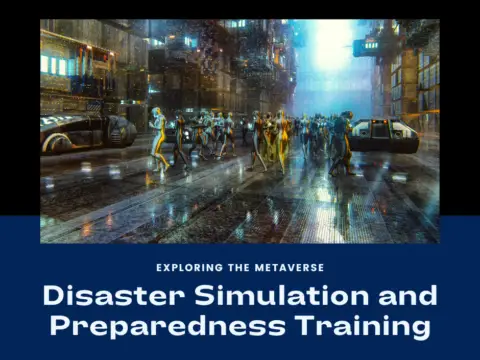The convergence of the metaverse and healthcare represents a paradigm shift in how medical professionals are trained and how patient care is delivered. The metaverse, a collective virtual shared space, offers immersive and interactive experiences that have transformative potential for the healthcare industry. In this exploration, we delve into how the metaverse is enhancing medical training and improving patient care through innovative virtual solutions.
1. Virtual Medical Training:
- Simulated Surgical Procedures: Within the metaverse, medical professionals can engage in highly realistic simulated surgical procedures, providing a risk-free environment for honing skills and refining techniques.
- Anatomy Exploration: Virtual reality (VR) and augmented reality (AR) in the metaverse enable in-depth exploration of human anatomy, offering medical students and professionals a three-dimensional understanding of the human body.
- Collaborative Learning Spaces: Medical students and professionals from around the world can collaborate in virtual learning spaces, fostering a global community of knowledge sharing and skill development.
2. Telemedicine and Remote Consultations:
- Virtual Clinics: The metaverse facilitates the creation of virtual clinics where patients can consult with healthcare providers in a secure and immersive environment, eliminating geographical barriers to healthcare access.
- Remote Monitoring: Through metaverse-powered applications, healthcare providers can remotely monitor patients’ vital signs and health metrics, enhancing the efficiency of chronic disease management.
- Immersive Patient Education: Patients can receive immersive education about their conditions and treatment plans through interactive metaverse experiences, leading to better-informed healthcare decisions.
3. Mental Health Support:
- Virtual Therapy Sessions: The metaverse offers a platform for virtual therapy sessions, providing individuals with mental health support in a comfortable and customizable environment.
- Stress Reduction: Virtual environments within the metaverse can be designed to promote relaxation and stress reduction, contributing to mental well-being and resilience.
- Support Communities: Patients dealing with similar mental health challenges can connect in virtual support communities, fostering a sense of belonging and understanding.
4. Collaborative Medical Research:
- Global Research Collaboration: Researchers can collaborate in virtual laboratories, breaking down geographical barriers and accelerating the pace of medical discoveries.
- Data Visualization: The metaverse enables the visualization of complex medical data in interactive 3D spaces, aiding researchers in gaining deeper insights into disease mechanisms.
- Drug Discovery: Virtual simulations within the metaverse can expedite the drug discovery process by providing researchers with tools for virtual testing and analysis.
5. Healthcare Training Simulations:
- Emergency Response Training: Healthcare professionals can undergo realistic emergency response training scenarios within the metaverse, preparing them for high-stakes situations.
- Patient Interaction Simulations: Virtual simulations allow medical students to practice patient interactions and develop communication skills in a controlled and supportive environment.
- Crisis Management: Healthcare teams can participate in simulated crisis management exercises, improving coordination and decision-making under pressure.
6. Ethical Considerations:
- Patient Privacy: As healthcare becomes more integrated with the metaverse, safeguarding patient privacy and ensuring secure data transmission are critical considerations.
- Accessibility: Ensuring that metaverse-powered healthcare solutions are accessible to all individuals, including those with disabilities, is essential for equitable healthcare delivery.
- Ethical Use of Technology: Adhering to ethical principles in the development and deployment of metaverse technologies in healthcare is paramount to building trust among patients and healthcare professionals.
The integration of the metaverse into healthcare holds immense potential to revolutionize medical training, enhance patient care, and foster global collaboration in medical research. However, it is crucial to address ethical considerations and ensure that these technologies are deployed responsibly, prioritizing patient well-being and data security.




